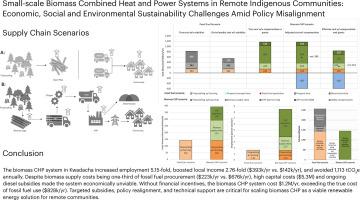Small-scale biomass combined heat and power systems in remote indigenous communities: Economic, social and environmental sustainability challenges amid policy misalignment
引用次数: 0
Abstract
This study evaluates the sustainability impacts of small-scale biomass combined heat and power (CHP) systems in remote communities, focusing on the case of Kwadacha, a remote Indigenous community in British Columbia. The analysis compares the biomass CHP system implemented in 2016 with the community’s previous diesel power and propane heating systems, examining economic, social, and environmental dimensions while exploring the factors that led to the project’s cessation in 2021.
The biomass CHP system demonstrated a 5.15-fold increase in local employment, a 2.76-fold rise in community income, and an annual greenhouse gas emissions avoidance of 1113 tCO₂e. It also achieved a notable supply chain cost advantage, with the cost of biomass transport and processing being approximately one-third that of diesel and propane delivery. However, high operational costs, escalating maintenance issues, and persistent labor shortages posed major barriers to long-term viability. These challenges were compounded by entrenched diesel subsidies, which created economic disincentives for renewable energy adoption despite clear sustainability gains.
The findings highlight the potential of biomass CHP systems to contribute to wildfire mitigation, rural economic development, and decarbonization in forested, off-grid communities. However, realizing these benefits requires policy realignment, sustained technical support, and integrated funding mechanisms. The Kwadacha project provides critical lessons for future deployments, emphasizing the need for context-specific strategies that balance economic, environmental, and social goals in the implementation of renewable energy systems.

偏远土著社区的小型生物质热电联产系统:政策偏差下的经济、社会和环境可持续性挑战
本研究评估了小型生物质热电联产(CHP)系统对偏远社区的可持续性影响,重点研究了不列颠哥伦比亚省偏远土著社区Kwadacha的案例。该分析将2016年实施的生物质热电联产系统与社区之前的柴油动力和丙烷加热系统进行了比较,考察了经济、社会和环境方面的因素,同时探讨了导致该项目于2021年停止的因素。生物质热电联产系统使当地就业增加了5.15倍,社区收入增加了2.76倍,年温室气体排放量减少了1113 tCO₂e。它还取得了显著的供应链成本优势,生物质运输和加工的成本约为柴油和丙烷运输的三分之一。然而,高昂的运营成本、不断升级的维护问题和持续的劳动力短缺构成了长期生存的主要障碍。根深蒂固的柴油补贴加剧了这些挑战,尽管可再生能源在可持续性方面有明显的收益,但这种补贴对可再生能源的采用造成了经济上的阻碍。研究结果强调了生物质热电联产系统在森林、离网社区的野火缓解、农村经济发展和脱碳方面的潜力。然而,实现这些好处需要政策调整、持续的技术支持和综合的筹资机制。Kwadacha项目为未来的部署提供了重要的经验教训,强调了在实施可再生能源系统时需要根据具体情况制定战略,平衡经济、环境和社会目标。
本文章由计算机程序翻译,如有差异,请以英文原文为准。
求助全文
约1分钟内获得全文
求助全文

 求助内容:
求助内容: 应助结果提醒方式:
应助结果提醒方式:


